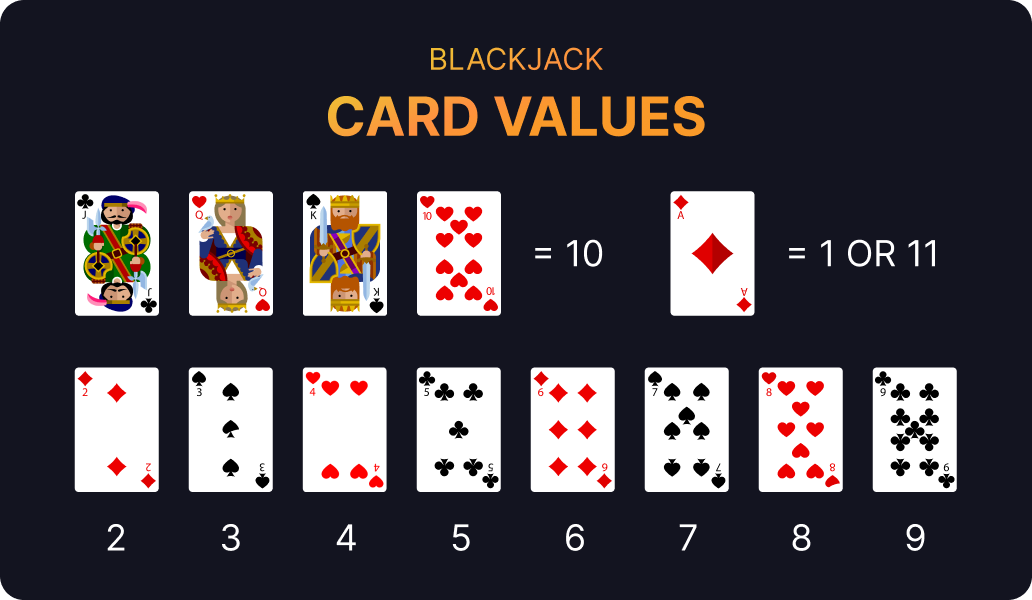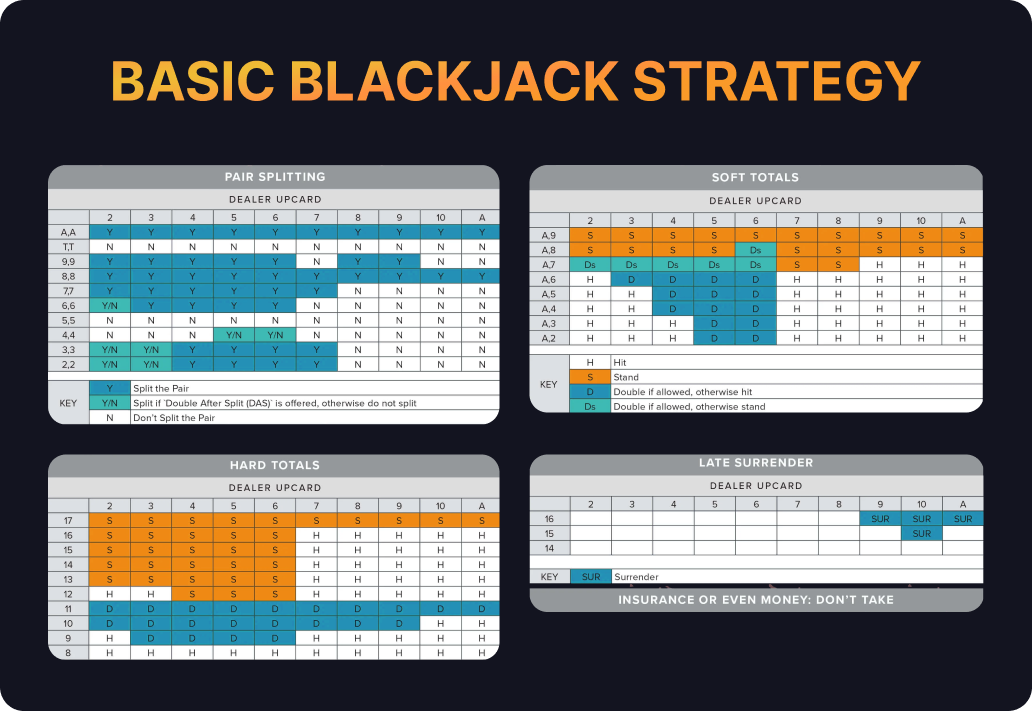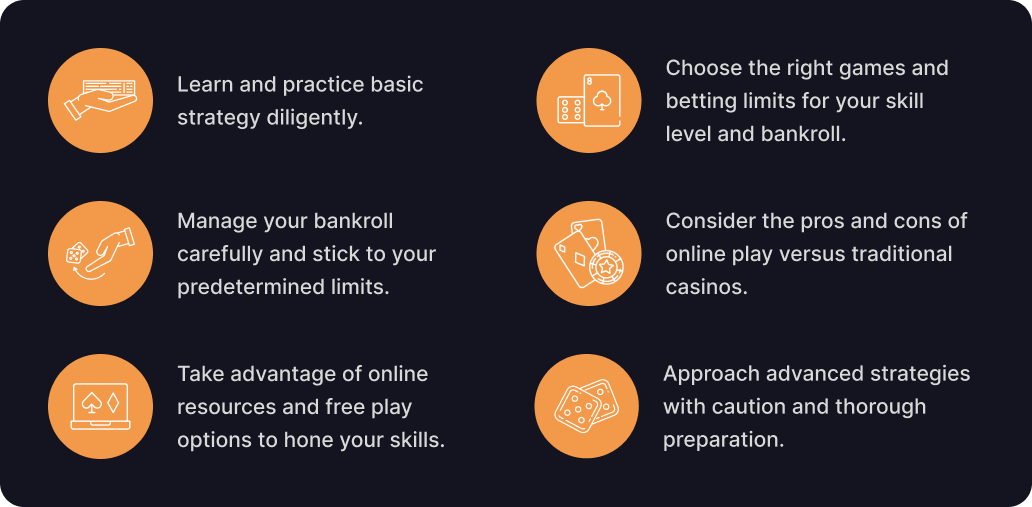Table of contents
Table of contents
Other Topics You May Like
Step-by-Step Guide to Playing and Winning at Blackjack: Basic Strategy
Simple guide to master your skills in BlackJack

Are you ready to up your game at the blackjack table? Whether you're a beginner looking to learn the basics or an experienced player aiming to refine your skills, mastering the basic blackjack strategy is your ticket to better odds and more exciting gameplay. Blackjack stands out among casino games as one where skill and strategy can significantly impact your success. Unlike games of pure chance, blackjack rewards players who take the time to learn and apply proper techniques.
In this guide, we'll walk you through everything you need to know about blackjack strategy, from understanding the fundamental rules to implementing advanced techniques. By the end of this guide, you'll have the knowledge and confidence! Let's dive in and discover how you can become a blackjack pro!
Understanding the Rules of Blackjack
Before we delve into strategy, it's crucial to have a basic knowledge of the game's fundamentals. Blackjack is a card game that pits you against the dealer, with the goal of getting as close to 21 points as possible without going over. While the basic premise is simple, the nuances of the game provide depth and opportunities for strategic play.
The Objective of the Game
Your primary aim in blackjack is to beat the dealer's hand without exceeding 21 points. You win if your hand is closer to 21 than the dealer's, or if the dealer busts (goes over 21). It's a game of skill and strategy, where your decisions can significantly impact the outcome.
Understanding this objective is crucial because it informs every decision you'll make during play. Unlike some casino games where you're competing against other players, in blackjack, your sole focus is on beating the dealer. This one-on-one nature of the game allows for more strategic decision-making and calculated risk-taking.
It's important to note that while reaching 21 is ideal, it's not always necessary to win. Often, having a hand that's simply better than the dealer's is enough. This understanding can help you avoid taking unnecessary risks when you already have a strong hand.
Card Values and Basic Rules

In blackjack, number cards (2-10) are worth their face value, face cards (Jack, Queen, King) are worth 10, and Aces can be worth 1 or 11, depending on what's best for your hand. This flexibility with Aces adds an extra layer of strategy to the game, as you can adjust your hand's value based on the situation.
The game begins with each player receiving two cards, while the dealer gets one face-up card and one face-down card. This initial deal sets the stage for the rest of the hand and provides your first strategic decision point. Based on these initial cards, you'll need to decide whether to hit (take another card), stand (keep your current hand), double down (double your bet and take one more card), or split (if you have a pair).
Understanding these options and when to use them is crucial to playing blackjack effectively:
- Hitting: Request an additional card to improve your hand. This is typically done when your hand value is low and you need to get closer to 21.
- Standing: Keep your current hand without drawing any more cards. This is usually done when you have a strong hand or when the risk of busting by hitting is too high.
- Doubling Down: Double your initial bet and receive one more card. This is a powerful move when used correctly, typically with hands of 9, 10, or 11.
- Splitting: If your initial two cards are a pair, you can split them into two separate hands, each with its own bet. This can be particularly advantageous with pairs of Aces or 8s.
Each of these actions has strategic implications, and learning when to employ each one is a key part of mastering blackjack. As we move forward, we'll explore how to make these decisions optimally based on your hand and the dealer's up card.
Basic Blackjack Strategy
Now that we've covered the basics, let's explore the heart of winning at blackjack: the basic strategy. This foundational approach to the game is essential for any player looking to improve their odds and enjoy long-term success at the blackjack table.
The Importance of Strategy in Blackjack
Unlike some casino games that rely purely on chance, blackjack is a game where skill and strategy can significantly improve your odds. The basic blackjack strategy is a mathematically optimal way to play each hand, based on the dealer's up card and your own cards. By following this strategy, you can reduce the house edge to less than 1%, giving you the best possible chance of winning in the long run.
The importance of this strategy cannot be overstated. Without it, players often rely on intuition or "gut feelings," which can lead to suboptimal decisions and increased losses over time. The basic strategy has been developed through extensive mathematical analysis and computer simulations, taking into account millions of possible hand combinations.
Implementing this strategy consistently can dramatically improve your performance. While it doesn't guarantee wins on every hand, it ensures that you're making the best possible decision based on the information available. This approach minimizes losses in unfavorable situations and maximizes gains when the odds are in your favor.
Moreover, understanding and applying basic strategy provides a solid foundation for more advanced techniques. It trains you to think analytically about each hand, considering both your cards and the dealer's up card. This mindset is crucial for progressing to more complex strategies as you gain experience.
Basic Strategy Principles
The core principles of basic blackjack strategy include:
- Always split Aces and 8s: This maximizes your potential to make strong hands. Splitting Aces gives you two chances to hit blackjack, while splitting 8s turns a weak 16 into two potentially stronger hands.
- Never split 5s: A pair of 5s is better played as a single hand of 10, which is a strong doubling opportunity.
- Double down on 11, unless the dealer shows an Ace: An 11 is a strong hand that has a good chance of improving to 21 with one more card. The exception is when the dealer shows an Ace, which increases their chances of having blackjack.
- Always hit on hard 12-16 if the dealer shows 7 or higher: When the dealer has a strong up card, you need to take the risk of hitting to improve your hand, even if it means potentially busting.
- Always stand on 17 or higher: These hands are strong enough that the risk of busting outweighs the potential benefit of hitting.
- NEVER SPLIT 10S. NEVER.
These rules form the foundation of basic strategy, but remember, there are more nuanced decisions based on specific card combinations. For example:
- Soft hands (hands with an Ace counted as 11) often warrant more aggressive play, such as doubling down or hitting when you would otherwise stand with a hard hand of the same value.
- The decision to hit or stand on a hard 16 can vary depending on the specific composition of your hand (e.g., 7-9 vs. 10-6) and the dealer's up card.
- In some cases, surrendering (giving up half your bet to end the hand immediately) can be the optimal play, particularly with hard 15 or 16 against a dealer's 10 or Ace.
Understanding these nuances and practicing their application is key to mastering basic blackjack strategy.
Strategy Charts

To make optimal decisions quickly, many players rely on blackjack strategy charts. These visual guides show the best play for every possible combination of your hand and the dealer's up card. While it may seem daunting at first, with practice, you'll find yourself naturally making the right calls. Remember, it's not about memorizing the entire chart, but understanding the underlying logic behind the decisions.
Strategy charts are typically color-coded for easy reference, with different colors representing actions like hit, stand, double down, or split. They're organized with the player's hand along one axis and the dealer's up card along the other, making it easy to find the correct play for any situation.
Here's a breakdown of how to use a strategy chart effectively:
- Start by identifying your hand type: Is it a hard hand, soft hand, or pair?
- Locate your hand value on the chart.
- Find the column corresponding to the dealer's up card.
- The intersection of your hand and the dealer's up card will show the recommended action.
While casinos generally allow the use of strategy cards at the table, it's beneficial to gradually internalize these decisions. As you play more, you'll start to recognize patterns and understand the reasoning behind each move. This will not only speed up your play but also deepen your understanding of the game.
It's worth noting that strategy charts can vary slightly depending on specific game rules, such as whether the dealer hits or stands on soft 17. Always ensure you're using a chart that matches the rules of the game you're playing.
Managing Your Bankroll
A crucial aspect of successful blackjack play is proper bankroll management. Even the best strategy won't help if you can't stay in the game long enough for it to pay off. Effective bankroll management is what separates casual players from serious contenders, and it's essential for long-term success at the blackjack table.
Setting a Budget

Before you sit down at a blackjack table or log into an online casino, determine how much you're willing to spend. This should be an amount you can comfortably afford to lose without impacting your daily life. Divide your total bankroll into session budgets, ensuring you have enough funds to weather the inevitable ups and downs of the game.
When setting your budget, consider the following factors:
- Your overall financial situation: Never gamble with money you can't afford to lose.
- The stakes of the games you plan to play: Higher stakes require a larger bankroll.
- Your skill level: Beginners should start with a more conservative budget.
- The length of your planned playing session: Longer sessions require more funds.
- Your risk tolerance: Some players are comfortable with more significant swings in their bankroll than others.
A common rule of thumb is to have at least 20 times the maximum bet you plan to make in a single hand. For example, if you're playing at a $25 minimum bet table and might occasionally double down or split, your maximum bet could be $50. In this case, a session budget of $1,000 would be appropriate.
It's also wise to set win and loss limits for each session. For instance, you might decide to stop playing if you double your initial session budget or if you lose half of it. This helps protect your winnings and prevents excessive losses.
Sticking to Your Limits
Once you've set your budget, it's crucial to stick to it. Avoid the temptation to chase losses or increase your bets dramatically when you're on a winning streak. Remember, blackjack is a marathon, not a sprint. Consistent play using basic strategy and proper bankroll management will yield better results in the long run than erratic betting.
Tips and Tricks for Beginners

If you're new to blackjack, here are some additional tips to help you get started and improve your game:
- Start with lower stakes tables to practice your strategy: This allows you to gain experience without risking significant amounts of money. Many casinos offer $5 or $10 minimum bet tables, which are perfect for beginners.
- Avoid insurance bets, as they typically have a high house edge: While it may seem like a safe option, insurance bets generally favor the casino in the long run. Unless you're an experienced card counter, it's best to decline this side bet.
- Don't be influenced by other players' decisions or superstitions: Each player's hand is independent, and what others do doesn't affect your odds. Focus on your own strategy and decision-making.
- Take advantage of free online blackjack games to practice without risking real money: Many online casinos and gaming sites offer free play options. Use these to familiarize yourself with the game and practice basic strategy without financial pressure.
- Consider using strategy cards at the table until you're comfortable with basic strategy: Most casinos allow these, and they're a great way to ensure you're making optimal decisions while you're still learning.
- Pay attention to table rules: Different tables may have slight variations in rules (like whether the dealer hits or stands on soft 17) that can affect the optimal strategy and house edge.
- Avoid drinking alcohol while playing: Staying sober helps you make clearer decisions and stick to your strategy and budget.
- Learn to recognize and avoid common beginner mistakes: These include standing on 12-16 against a dealer's high card, splitting 10s, and not splitting 8s.
- Understand the concept of variance: Short-term results can vary wildly from the expected outcome. Don't get discouraged by short losing streaks or overconfident from brief winning streaks.
- Start with basic strategy before moving on to more advanced techniques: Master the fundamentals before attempting more complex strategies like card counting.
Remember, becoming proficient at blackjack takes time and practice. Don't get discouraged if you make mistakes early on – it's all part of the learning process. Every experienced player was once a beginner, and consistent practice and study will improve your skills over time.
It's also beneficial to observe experienced players at the tables. While you shouldn't copy their every move (as they might be using advanced strategies or making errors), you can learn a lot about game flow, etiquette, and decision-making by watching others play.
Lastly, always prioritize enjoyment. While winning is exciting, the primary goal should be to have fun. If you find yourself getting frustrated or overly stressed about losses, it's time to take a break. Approaching the game with a positive attitude not only makes it more enjoyable but can also lead to better decision-making at the table.
Advanced Strategies

Once you've mastered basic strategy, you might be interested in exploring more advanced techniques. Card counting, about which we have already made an article, is perhaps the most well-known advanced strategy, made famous by books and movies. While it's not illegal, casinos frown upon it and may ask skilled counters to leave. Other advanced strategies include shuffle tracking and ace sequencing. However, these techniques require significant practice and are generally not necessary for casual players to enjoy and potentially profit from blackjack.
Playing Blackjack Online
The rise of online casinos has made blackjack more accessible than ever. Playing online offers several advantages, but it's important to choose the right platform.
Choosing an Online Casino
When selecting an online casino for blackjack, consider the following factors:
- Licensing and regulation: Ensure the casino is licensed by a reputable authority. This helps guarantee fair play and financial security.
- Game variety: Look for casinos offering multiple blackjack variants. Popular variations include European Blackjack, Atlantic City Blackjack, and Live Dealer games. Having a variety allows you to choose games with the most favorable rules.
- Bonuses and promotions: Take advantage of welcome bonuses and ongoing promotions. However, always read the terms and conditions carefully. Some bonuses may not be applicable to blackjack or may have high wagering requirements.
- Payment options: Check for convenient and secure banking methods. Look for casinos that offer a range of options including credit/debit cards, e-wallets, and bank transfers. Also, consider withdrawal times and any associated fees.
- Customer support: Reliable customer service is crucial for a smooth gaming experience. Look for casinos offering 24/7 support through multiple channels like live chat, email, and phone.
- Software providers: Reputable software providers ensure fair and smooth gameplay. Look for well-known names like Microgaming, NetEnt, or Evolution Gaming for live dealer games.
- Mobile compatibility: If you plan to play on your smartphone or tablet, ensure the casino has a well-designed mobile site or app.
- Reputation and user reviews: Research the casino's reputation among players. Look for reviews on independent gambling forums and watchdog sites.
Best options of online casino with live dealer blackjack you can find in our special section — Best Payout Online Casinos. They are trusted and well-known, so don’t hesitate to join and have some fun.
Benefits of Playing Online
Online blackjack offers several advantages over traditional casino play:
- Convenience: Play from the comfort of your home at any time
- Lower minimum bets: Online tables often have lower minimum bets than physical casinos
- Faster gameplay: Online games move at a quicker pace, allowing for more hands per hour
- No distractions: Play in a focused environment without the noise and bustle of a casino
- Practice mode: Many online casinos offer free play options to hone your skills
Conclusion
Mastering blackjack strategy is a journey that combines understanding the game's rules, implementing basic strategy, managing your bankroll, and potentially exploring advanced techniques. Whether you're playing in a traditional casino or online, the principles remain the same.
By following basic strategy, you can reduce the house edge to less than 1%, giving yourself the best possible chance of success. Remember that while strategy can significantly improve your odds, blackjack is still a game of chance, and there's no guaranteed way to win every time.

As you continue your blackjack journey, remember that consistency is key. Stick to your strategy even when you're on a losing streak, and don't let short-term results cloud your judgment. With time and practice, you'll find your decision-making becoming more automatic and your overall play improving.
Most importantly, always play responsibly. Set realistic expectations, stick to your budget, and remember that blackjack should be an enjoyable form of entertainment, not a way to make money. If you ever feel that gambling is negatively impacting your life, don't hesitate to seek help from organizations dedicated to responsible gaming.
With practice and patience, you'll find yourself making better decisions and potentially walking away from the blackjack table with more wins under your belt. Good luck, and may the cards be in your favor!

















